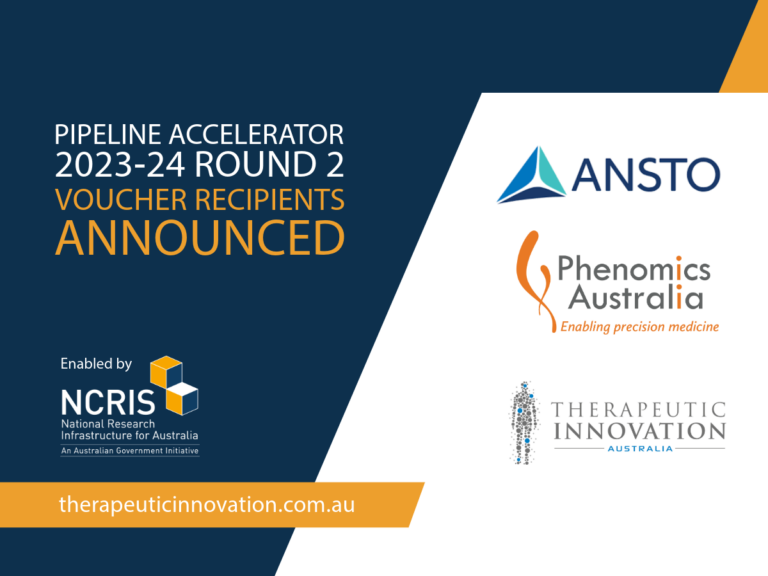

In partnership with Phenomics Australia (PA), Therapeutic Innovation Australia (TIA) is pleased to announce the successful recipients of the Pipeline Accelerator 2023-24 (Round 2).
Through the National Collaborative Research Infrastructure Strategy (NCRIS) program, TIA and PA support a network of national research infrastructure to address the medical products challenge in the 2021 National Research Infrastructure (NRI) Roadmap. We collectively offer academic researchers and SMEs access to a diverse range of Australian translational medical research capabilities, from the molecular basis of health and disease through to clinical trials.
Thirty four projects to share $1,012,068 in voucher awards to access translation national research infrastructure (NRI) to accelerate the translation of therapeutics to improve human health. Research in kidney, heart, cancer, and infectious disease, among others, will advance with the support from TIA and PA. These vouchers will subsidise a maximum of $50,000 of the total cost to access these translation NRI.
Among the recipients, we would like to highlight Dr. Louise Robertson’s (University of Adelaide) project on next-generation CRISPR therapeutics for autosomal dominant retinitis pigmentosa. This project is jointly supported by TIA and PA to access two facilities – South Australia Genome Editing Facility (PA) and Vector and Genome Engineering Facility (TIA). Recipients were awarded with the the TIA Pipeline Accelerator 2023-24 (Round 2) listed below.
· Associate Professor Greg Arndt (Children’s Cancer Institute). Hit identification using DEL for the development of small molecule targeted treatment of osteosarcomas. Provider: Monash Fragment Platform.
· Dr Sofia Burgener (University of Queensland). Caspase-1 inhibitors for the treatment of inflammatory disease. Provider: Compounds Australia, Queensland.
· Associate Professor Antoine de Weck (Children’s Cancer Institute). The druggable transcriptome: Small Molecules inducing Reading Frame Stops (SMIRFS). Provider: ACRF Drug Discovery Centre for Childhood Cancer.
· Dr Natalie Diepenhorst (Monash University). Lead discovery for the orphan GPCR, GPR88. Provider: Monash Fragment Platform.
· Dr Rabina Giri (Mater Research Institute). Microbiome derived IBD small molecule. Provider: Queensland Emory Drug Discovery Initiative.
· Professor Mohammed Akhter Hossain (Florey Institute of Neuroscience). Novel brain peptide receptor analgesics: Accelerated target validation and pre-clinical testing of RXFP3 activators. Provider: Centre for Integrated Preclinical Drug Development.
· Dr Adam Johnson (Skin2Neuron). Development of automated manufacture of hair follicle-derived neuroprecursors for GLP-Tox IND-enabling studies. Provider: Biologics Innovation Facility.
· Scientia Associate Professor Nadeem Kaakoush (University of New South Wales). Discovery of novel therapeutic compounds targeting the microbiome-immune axis in ulcerative colitis. Provider: ANU Centre for Therapeutic Discovery.
· Associate Professor Charlene Kahler (University of Western Australia). Breaking ceftriaxone resistance in Neisseria gonorrhoeae using an inhibitor of lipid A phosphethanolamine transferase (EptA). Provider: Monash Fragment Platform.
· Dr Hannah Kelly (Australian National University). Improving mRNA vaccines with precision vaccinology. Provider: UNSW RNA Institute.
· Professor Chris Langmead (Phrenix Therapeutics Pty Ltd). Pre-candidate selection for novel schizophrenia therapeutics. Provider: Centre for Drug Candidate Optimisation.
· Dr Makutiro Masavuli (Basil Hetzel Institute (BHI) for Translational Health Research). mRNA vaccine for HCV. Provider: BASE Facility.
· Dr Michael Nafisinia (Westmead institute for Medical Research). Enhancing Therapeutic Efficacy: Pioneering Large-Scale Drug Pipeline Development and Testing on PKU Patients’ iPSC-Derived Hepatocytes. Provider: ACRF Drug Discovery Centre for Childhood Cancer.
· Dr Rhys Parry (University of Queensland). Self-amplifying RNAs with modified NTPs: a next-generation vaccine and therapeutic platform. Provider: BASE Facility.
· Associate Professor Danielle Stanisic (Griffith University). Manufacturability assessment of a whole parasite malaria vaccine. Provider: CSIRO Biomedical Manufacturing.
· Dr Ruth Thornton (Telethon Kids Institute). Blitz-OM- development of a slow-release anti-biofilm treatment to prevent the need for recurrent grommet surgery. Provider: CSIRO Biomedical Manufacturing.
· Associate Professor Kathryn Fay Tonissen (Griffith University). Characterisation of covalent binders for a potential new drug target in oncology, Carbonic Anhydrase 3. Provider: Compounds Australia and Mass Spectrometry Screening Platform.
· Dr Rohan Volpe (Walter and Eliza Hall Institute of Medical Research). Pharmacokinetic profiling of two novel antiviral coronavirus protease inhibitors towards clinical application for COVID-19 and beyond. Provider: Centre for Drug Candidate Optimisation.
· Professor Stephanie Watson (University of Sydney). Transforming corneal stem cell-based therapies with innovative bioengineered technologies. Provider: CSIRO Biomedical Manufacturing.
· Dr Lucia Florencia Zacchi (University of Queensland). Characterisation of novel antibodies for the treatment of neuropathic pain. Provider: National Biologics Facility.
· Mr Michael Grant (Q-Sera Pty Ltd). RAPClot bioassay validation and optimisation. Provider: CSIRO Biomedical Manufacturing.
In addition to the Pipeline Accelerator awards, two researchers were awarded the Technical Feasibility Assessments (TFAs) vouchers. They are:
· Dr Yvette Wooff (Australian National University). Red blood cell-extracellular vesicles to treat retinal degenerative diseases. Provider: Centre of Excellence in Cellular Immunotherapy.
· Dr Sarah Sutherland (Chris O’Brien Lifehouse). Exploring the Feasibility of Tumour Infiltrating Lymphocyte (TIL) Therapy in Appendiceal Cancer. Provider: Cell & Molecular Therapies.
